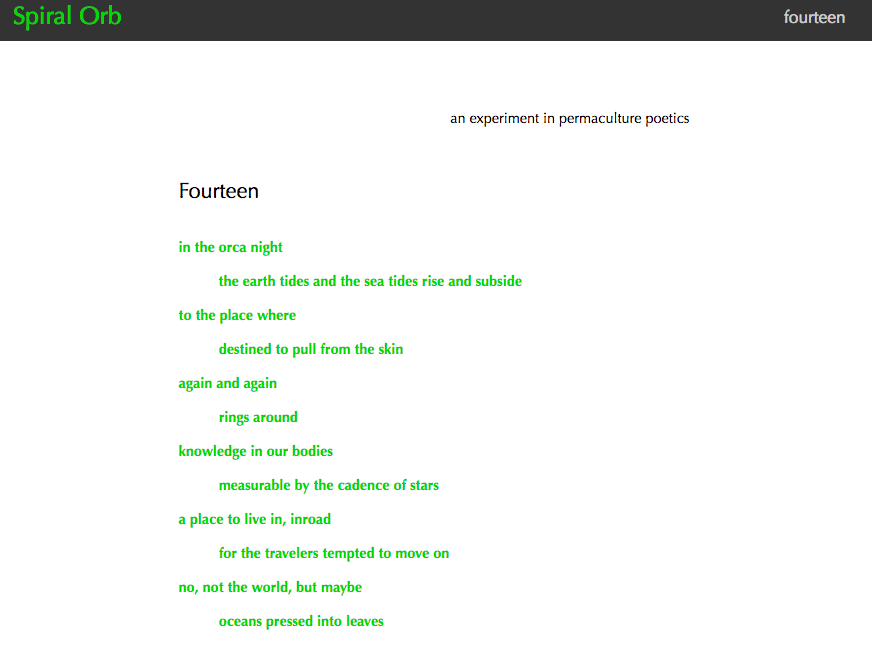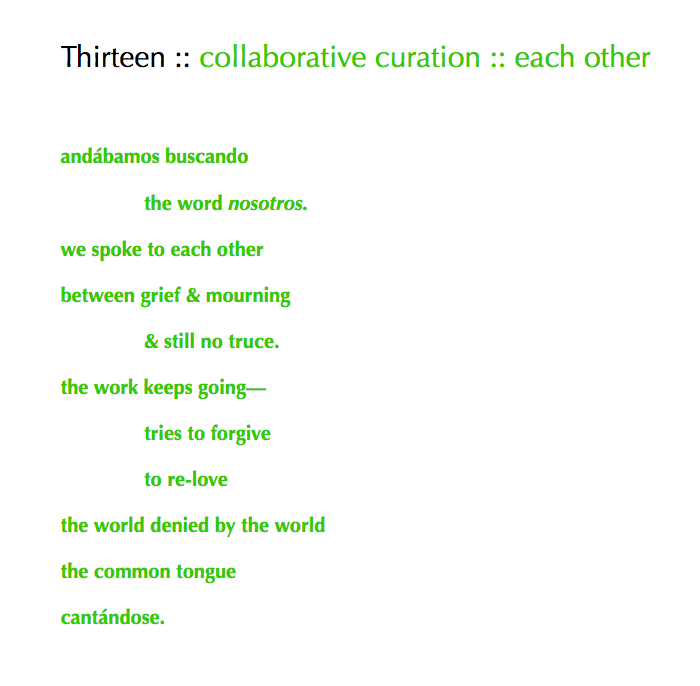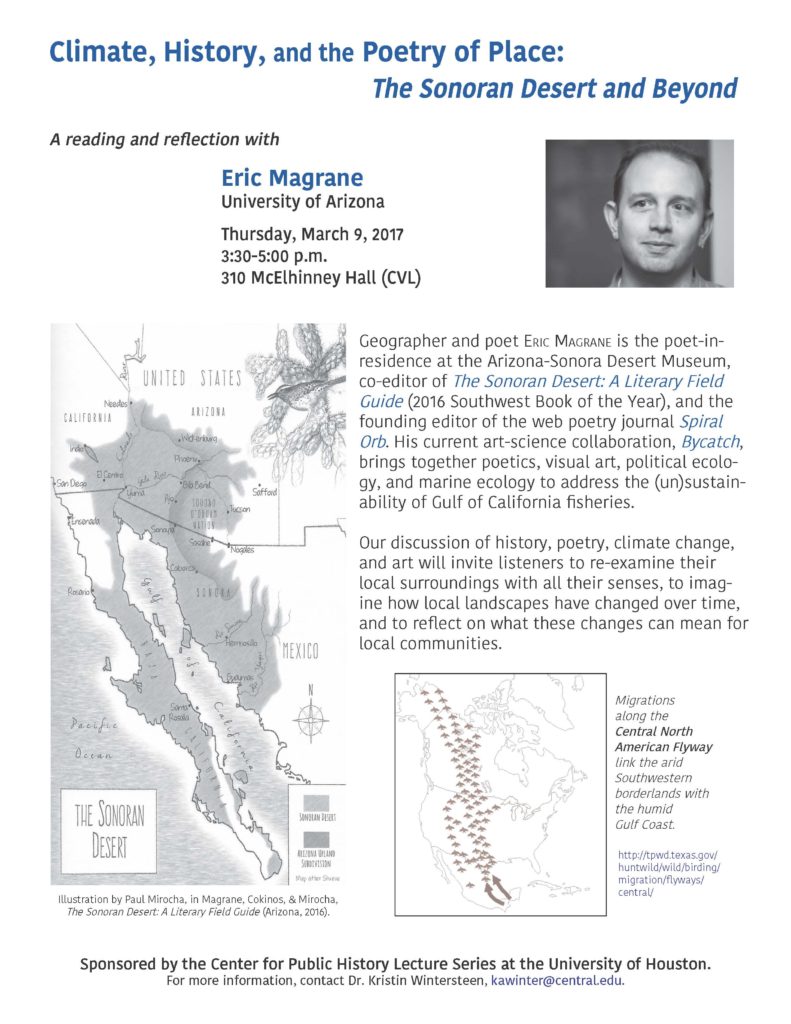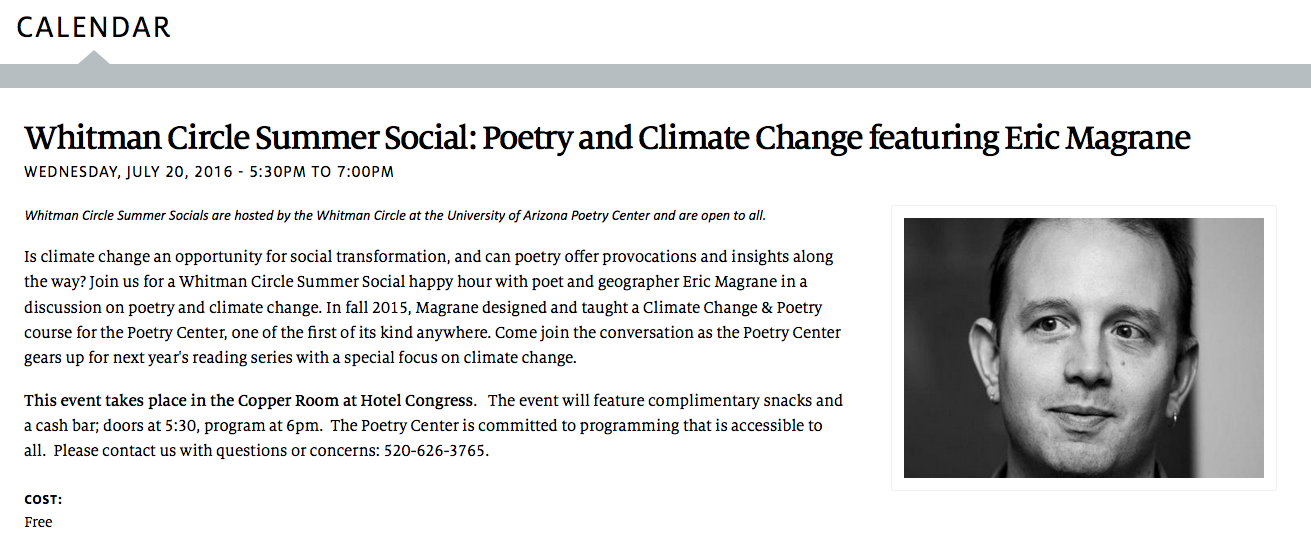Two for Antipode
Sarah de Leeuw and I wrote a chapter on geopoetics for Antipode’s new book Keywords in Radical Geography: Antipode at 50. The whole book is free to access and download here.
Also in Antipode: I recently reviewed the book Ecopoetics: Essays in the Field (University of Iowa Press, 2018), edited by Angela Hume and Gillian Osborne. The review is available here.
A Literary Inventory of Organ Mountains-Desert Peaks Reading May 4, 2019
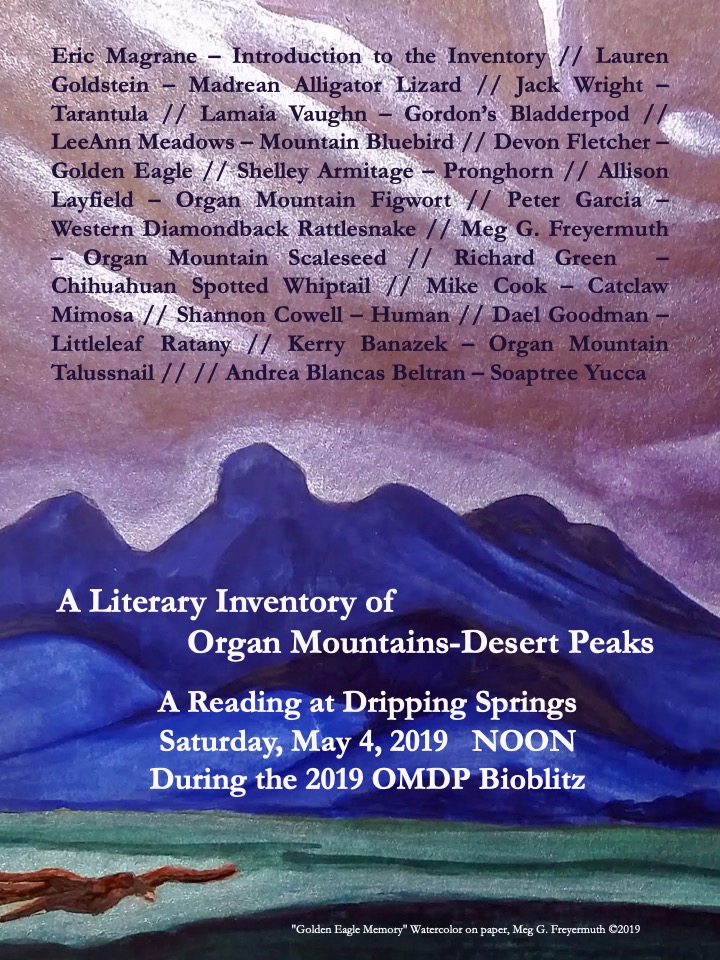
New article in Literary Geographies
My article ‘Healing, Belonging, Resistance, and Mutual Care’: Reading Indigenous Ecopoetics and Climate Narratives has been published in the new issue of the online open-access journal Literary Geographies. View the pdf here.
Here is the article’s abstract:
Narratives of climate change place it alternately as an environmental justice issue, a national and global security issue, an apocalyptic threat to life on earth, an opportunity for social change, and more. In this article, I aim to bring critical geographic work on climate narratives into conversation with contemporary poetry, through close readings of specific poems. I argue that the work of contemporary poets, and in particular the work of Indigenous ecopoetics, is rich in poetic texts that offer imaginative practices for recalibrating climate change narratives. I look particularly to works by Craig Santos Perez, Kathy Jetn̄il-Kijiner, Allison Adelle Hedge Coke, Joy Harjo, and Linda Hogan. I approach the poems as both a critical geographer and as a poet, thinking through and with their form and content in relation to climate narratives, and in relation to a description of Indigenous ecopoetics by Perez. I meet these poems as stored energy, as actors themselves in a human and more-than-human collective. A close reading of the craft of creative texts—particularly to the level of the line in poetry—highlights the inextricable connection between form and content in how a poem acts and means in the world. As a non-Indigenous reader of texts by Indigenous poets, my goal is not to perform a ‘master’ reading or analysis of these texts, but rather to learn from the poems and in doing so attempt to decolonize my own thought, a process that is a constant practice.
Spiral Orb Fourteen
With work by Daniel Biegelson, Rosemarie Dombrowski, Gabrielle Grace Hogan, Rose Knapp, W.J. Lofton, John Martin, Michael J. Pagán, Stephen Siperstein, Jonathan Skinner, Julia Wieting, Tyrone Williams, Gavin Yates + an entry poem composted from fragments of each of the pieces in the issue, Spiral Orb Fourteen is here.
Spiral Orb Thirteen
Spiral Orb Thirteen is here.
With work by:
Juana Adcock, Jamaica Baldwin, Rocío Carlos, Joshua Jennifer Espinoza, Hannah Kezema, Rajiv Mohabir, Óscar de Pablo, Lauren Russell, Danez Smith, Simon Seisho Tajiri, and Ellen Welcker;
Curated by:
Ari Banias, Chiwan Choi, Angel Dominguez, Maricela Guerrero, Amaud Jamaul Johnson, Melanie Noel, Anjoli Roy, Eugenio Tisselli, Deborah Woodard, and Aiko Yamashiro;
as well as an entry poem composted from fragments of each of the pieces in the issue.
This is a special issue guest edited by Wendy Burk, “Collaborative Curation: Each Other.”
Bycatch Exhibit at University of Arizona Museum of Art
BYCATCH EXHIBIT AT UNIVERSITY OF ARIZONA MUSEUM OF ART
February 4 through April 2, 2017
Opening Reception: Thursday, February 9, 5:00-7:00 pm
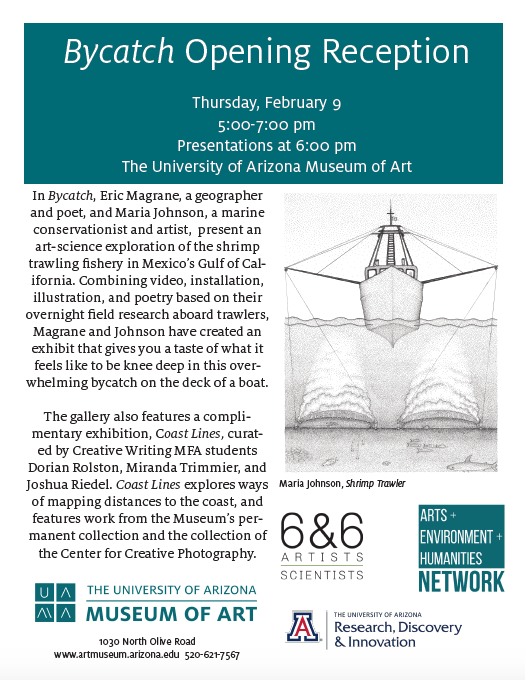
What Will Stand in ACME International Journal of Critical Geographies
A new publication, including scores and sound files, is included in the latest issue of ACME International Journal of Critical Geographies. You can access it here at ACME or here at academia.edu.
Magrane, E., W. Burk, and E. Quin-Easter. 2016. What will stand: Songs from (F)light, a collaborative borderlands song cycle. ACME: An International Journal for Critical Geographies 15 (2): 482-510.
(F)light: a borderlands song cycle is a creative response to migration. We wrote and composed the cycle of nine songs in relation to two particular borders: those between Arizona, United States and Sonora, Mexico; and Maine, United States and New Brunswick, Canada. The songs address borders, geopolitics, mobility, emotion, and narrative. We briefly contextualize our collaboration on (F)light and then share three songs from the project, as scores and as sound files performed by Women in Harmony, a women’s chorus in Portland, Maine.
(The sound files can be accessed either by clicking on the icons on the top of the scores if viewing the pdf in Adobe, or through clicking on the supplementary files on the right side of the ACME console.)
Poetry and Climate Change at Hotel Congress: Wednesday, July 20, 2016
At the Copper Room of Tucson’s Hotel Congress on Wednesday, July 20, 2016, 5:30pm to 7:00pm
Bycatch poems and drawings in Zócalo and Coordinates Society Magazine
Early poems and drawings from Bycatch appear in April’s Zócalo and at the new online Coordinates Society Magazine.
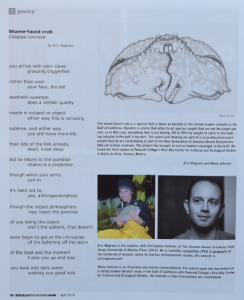
Shame-faced crab in Zócalo
Bycatch is a co-produced art-science project that combines geohumanities, political ecology, poetics, art, and marine ecology to creatively respond to the shrimp trawling industry in the Gulf of California. “Bycatch” refers to everything captured that is not the target species, so in this case, everything that is not shrimp. Approximately 87% of the weight of catch by shrimp trawlers is made up of 225+ species of bycatch fish, invertebrates, and turtles. The majority of shrimp caught in the industry is sold in the U.S.
I am collaborating with marine biologist and illustrator Maria Johnson on this project as part of the Next-Gen 6&6 Art + Science initiative. The field work for this collaboration has included overnight trips aboard shrimp trawlers off of Bahía de Kino, Sonora.
